rampant
Thursday, 31 May 2018
American Loon #2022: Patricia Moore-King
Read the full lunacy: #2022: Patricia Moore-King Encyclopedia of American Loons
This is what happens, if you treat cancer with homeopathy
Read the rest here: This is what happens, if you treat cancer with homeopathy
Wednesday, 30 May 2018
Aluminum in vaccines – new paper dismisses anti-vaxxer claims
The SUNDAY TIMES just broke my BS-meter
Read the rest here: The SUNDAY TIMES just broke my BS-meter
Tuesday, 29 May 2018
Here’s What Oncologists Won’t Tell You About Essential Oils
Read the rest here: Here’s What Oncologists Won’t Tell You About Essential Oils
American Loon #2021: Kaitlyn Moore
Read the full lunacy: #2021: Kaitlyn Moore Encyclopedia of American Loons
Monday, 28 May 2018
Homeopathy: progress at last!!!
Read the rest here: Homeopathy: progress at last!!!
Sunday, 27 May 2018
Seven thinks you might want to know about ‘CEASE’ therapy (as practised by homeopaths and naturopaths)
Read the rest here: Seven thinks you might want to know about ‘CEASE’ therapy (as practised by homeopaths and naturopaths)
American Loon #2020: E. Ray Moore
Read the full lunacy: #2020: E. Ray Moore Encyclopedia of American Loons
Saturday, 26 May 2018
Acupuncture for acute stroke? Perhaps better not!
Read the rest here: Acupuncture for acute stroke? Perhaps better not!
Friday, 25 May 2018
American Loon #2019: Gene Moody
Read the full lunacy: #2019: Gene oody Encyclopedia of American Loons
Acupuncture: a beautiful theory slain by an ugly fact
Read the rest here: Acupuncture: a beautiful theory slain by an ugly fact
Thursday, 24 May 2018
Homeopathic Prevention and Management of Epidemic Diseases
Read the rest here: Homeopathic Prevention and Management of Epidemic Diseases
Wednesday, 23 May 2018
Exeter University offers bogus treatments, but is ‘not in a position to actively condone the effectiveness of such treatments’
Read the rest here: Exeter University offers bogus treatments, but is ‘not in a position to actively condone the effectiveness of such treatments’
Tuesday, 22 May 2018
American Loon #2017: Jeff Monroe et al.
Read the full lunacy: #2017: Jeff Monroe et al. Encyclopedia of American Loons
New back pain study: “support for the inclusion of chiropractic care as a component of multidisciplinary health care for low back pain”
Read the rest here: New back pain study: “support for the inclusion of chiropractic care as a component of multidisciplinary health care for low back pain”
Monday, 21 May 2018
More about homeopathy in Switzerland: “Globuli only cause unnecessary healthcare costs”
Read the rest here: More about homeopathy in Switzerland: “Globuli only cause unnecessary healthcare costs”
Sunday, 20 May 2018
2018 SkS Weekly Climate Change & Global Warming Digest #20
Story of the Week... El Niño/La Niña Update... Toon of the Week... Quote of the Week... Coming Soon on SkS... Poster of the Week... Climate Feedback Reviews... SkS Week in Review... 97 Hours of Consensus...
Story of the Week...
Water shortages to be key environmental challenge of the century, Nasa warns
Freshwater supplies have already seriously declined in 19 global hotspots – from China to the Caspian Sea – due to overuse, groundbreaking study shows
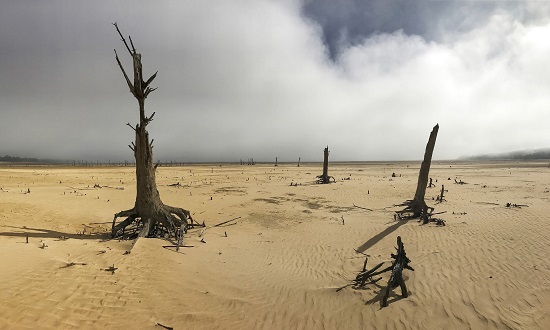
The Theewaterskloof Dam, a key source of water supply to Cape Town, South Africa ahead of the current water crisis. Photograph: Halden Krog/AP
Water shortages are likely to be the key environmental challenge of this century, scientists from Nasa have warned, as new data has revealed a drying-out of swaths of the globe between the tropics and the high latitudes, with 19 hotspots where water depletion has been dramatic.
Areas in northern and eastern India, the Middle East, California and Australia are among the hotspots where overuse of water resources has caused a serious decline in the availability of freshwater that is already causing problems. Without strong action by governments to preserve water the situation in these areas is likely to worsen.
Some of these hotspots were previously undocumented or poorly understood: a region in north-western China, in Xinjiang province, has suffered dramatic declines despite receiving normal amounts of rainfall, owing to groundwater depletion from industry and irrigation.
Water shortages to be key environmental challenge of the century, Nasa warns by Fiona Harvey, Environment, Guardian, May 16, 2018
El Niño/La Niña Update...
The La Niña event that overtook the tropical Pacific this past winter is officially over, according to the latest update from NOAA’s Climate Prediction Center. La Niña’s signature of heavier-than-usual rainfall in the western part of the basin has tapered off, and the cool surface waters in the central part of the basin are dissipating.
Adios, La Niña by Rebecca Lindsey, NOAA's Climate.gov, May 11, 2018
Toon of the Week...
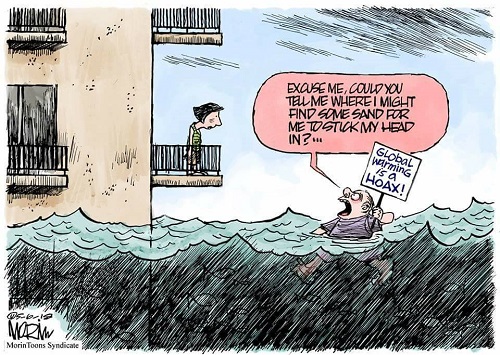
Quote of the Week...
The complexity of climate science may always be at odds with the simplicity that's key to inspiring action.
Remember the hole in the ozone layer? It was more of a thin spot, but in the 1980s, that dramatic term may have helped spur a global movement to reduce certain pollutants staved off disaster.
It's too late to prevent anthropogenic climate change, or unnatural climate change, or global warming — call it what you will. But it isn't too late to slow the warming, and perhaps even reverse it. If only someone could sell the idea.
Inspiring Terms Are Simple. ‘Climate Change’ Isn’t., Opinion by Faye Flam, Bloomberg News, May 11, 2018
Graphic of the Week...
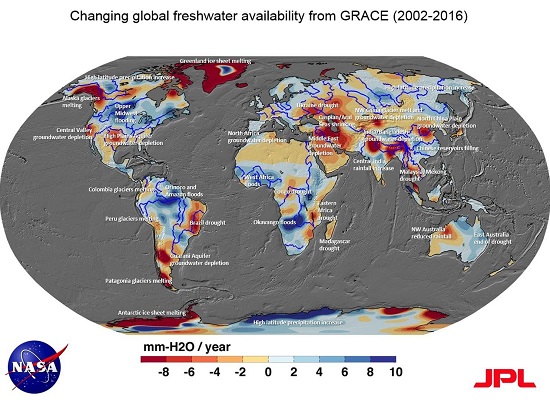
Coming Soon on SkS...
- Yes, EVs are green and global warming is causing sea level rise (Dana)
- Climate change is already making droughts worse (Benjamin Cook)
- Global warming, hurricanes, and rain (John Abraham)
- Climate science websites around the world (Baerbel)
- New research this week (Ari)
- 2017 SkS Weekly Climate Change & Global Warming News Roundup #21 (John Hartz)
- 2017 SkS Weekly Climate Change & Global Warming Digest #21 (John Hartz)
Poster of the Week...

Climate Feedback Reviews...
Wall Street Journal commentary grossly misleads readers about science of sea level rise
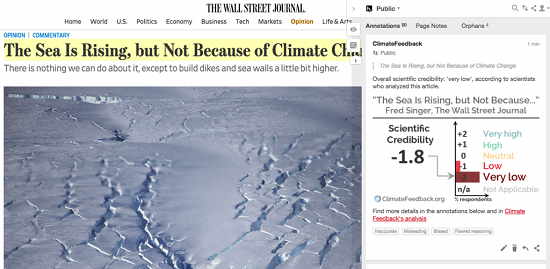
Climate Feedback asked its network of scientists to review the article, The Sea Is Rising, but Not Because of Climate Change, Opinion by Fred Singer, The Wall Street Journal, May 15, 2018.
Five scientists analyzed the article and estimate its overall scientific credibility to be 'very low'.
A majority of reviewers tagged the article as Biased, Flawed reasoning, Inaccurate, and Misleading
Review Summary
This commentary published by The Wall Street Journal, written by Fred Singer, claims that warming (and therefore greenhouse gas emissions) has no effect on global sea level rise. Although Singer concedes the physical fact that water expands as its temperature increases, he claims that this process must be offset by growth of Antarctic ice sheets.
Scientists who reviewed this opinion piece explained that it is contradicted by a wealth of data and research. Singer bases his conclusion entirely on a cherry-picked comparison of sea level rise 1915-1945 and a single study published in 1990, claiming a lack of accelerating sea level rise despite continued warming. But in fact, modern research utilizing all available data clearly indicates that sea level rise has accelerated, and is unambiguously the result of human-caused global warming.
Since the 1990s for example, satellites have measured an acceleration in the rate of global sea level rise:
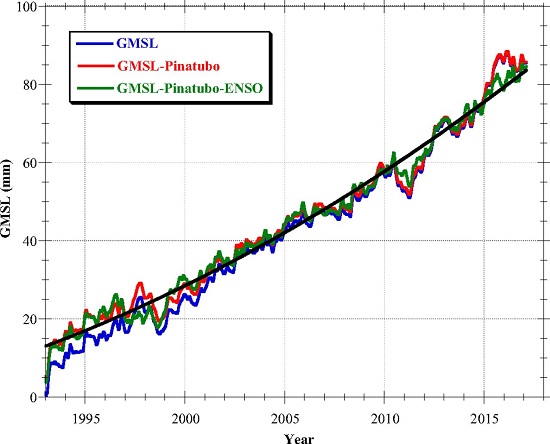
Figure – Global mean sea level (blue), after removing an estimate for the impacts of the eruption of Mount Pinatubo (red), and after also removing the influence of El Niño (green), fit with a quadratic (black). From Nerem et al. (2018)
Wall Street Journal commentary grossly misleads readers about science of sea level rise, Edited by Emmanuel M Vincent, Climate Feedback, May 18, 2018
SkS Week in Review...
- 2018 SkS Weekly Climate Change & Global Warming News Roundup #20 by John Hartz
- New research, May 7-13, 2018 by Ari Jokimäki
- Global solar capacity grew faster than fossil fuels in 2017, says report by Simon Evans (Carbon Brief)
- Video: The Myth of the Mini Ice Age by greenman3610 (Climate Denial Crock of the Week)
- SkS Analogy 12 - A Sinking ship reaches new heights by Evan & jg
- California, battered by global warming’s weather whiplash, is fighting to stop it by Dana Nuccitelli (Climate Consensus - the 97%, Environment, Guardian)
- 2018 SkS Weekly Climate Change & Global Warming Digest #19 by John Hartz
97 Hours of Consensus...
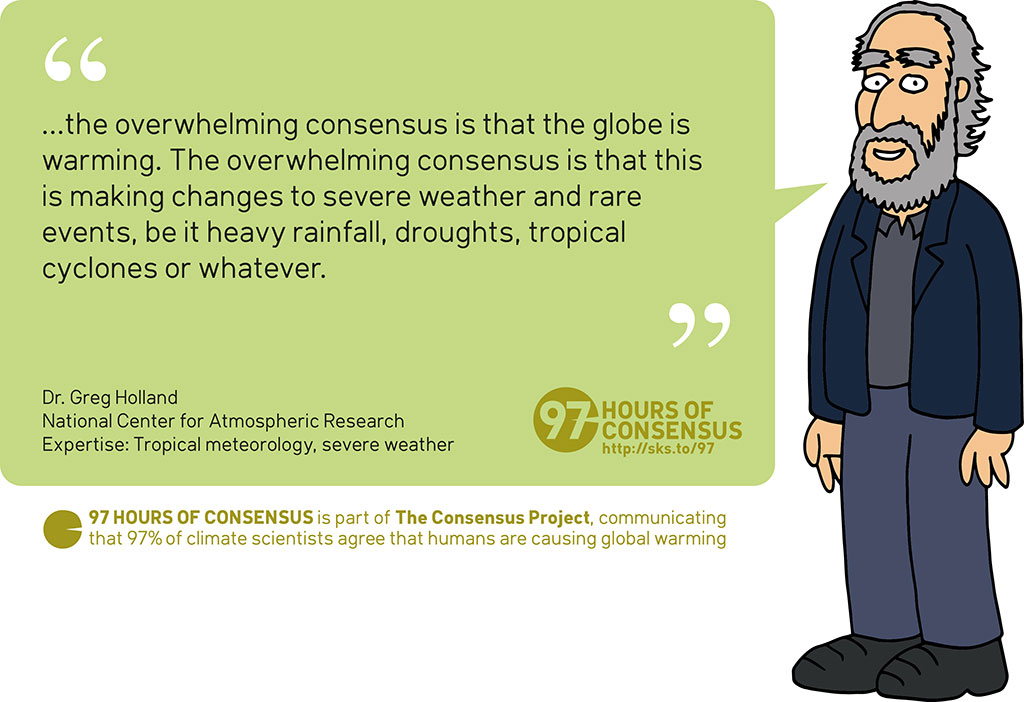
Greg Holland's bio page.
Quote derived from:
"I think we definitely need to actually change our habits so that we can leave our children and our children's children with a better world to live in. But in the meantime, over the rest of my lifetime and indeed the rest of your lifetime and many other people, we are going to have to adapt, we're going to have to accept that it's not gonna be six days per summer of extreme temperatures, it may be 20 days per summer of extreme temperatures and we have to take the appropriate actions to actually live with those conditions.
...the overwhelming consensus is that the globe is warming. The overwhelming consensus is that this is making changes to severe weather and rare events, be it heavy rainfall, droughts, tropical cyclones or whatever."
High resolution JPEG (1024 pixels wide)
from Skeptical Science
via IFTTT
American Loon #2016: Matt Monarch
Read the full lunacy: #2016: Matt Monarch Encyclopedia of American Loons
Saturday, 19 May 2018
2018 SkS Weekly Climate Change & Global Warming News Roundup #20
Editor's Pick
Urgent Climate Action Required to Protect Tens of Thousands of Species Worldwide, New Research Shows
Limiting global warming to 2 degrees and not the more ambitious 1.5 degrees would put far more species at risk of extinction. Insects are especially vulnerable.

A mere half degree of extra global warming could mean profound risks for tens of thousands of the planet's species, scientists have found. Credit: Alex Wong/Getty Images
Humanity can powerfully improve the survival odds of tens of thousands of species, but only if nations dramatically raise their ambitions in the fight against climate change, according to new research published on Thursday in the journal Science.
One key to salvaging plant and vertebrate habitat and protecting the world's biodiversity is to limit warming to the most challenging benchmark established under the 2015 Paris treaty—1.5 degrees Celsius of warming—not to the treaty's less stringent 2 degree guardrail, the study found.
The study assessed, in more detail than ever before, a key measure of extinction risk: the shrinking size of each species' current geographical range, or natural habitat. It projected that for an alarming number of species, their range size would shrink by at least half as temperatures rise past the Paris goals.
If nations do no more than they have pledged so far to reduce their greenhouse gas emissions—and warming consequently shoots past 3 degrees by the end of this century—6 percent of all vertebrates would be at risk. So would 44 percent of plants and a whopping 49 percent of insects.
But the dangers would be greatly reduced if warming can be limited to 1.5 degrees. That might protect the overwhelming majority of the 115,000 species assessed by the researchers. Just 4 percent of vertebrates would lose more than half of their current range. Only 8 percent of plants and 6 percent of insects would face that risk.
Keeping warming to 2 degrees is not nearly as effective, they found. The additional half degree of warming would double the impact on plants and vertebrate species, and triple the impact on insects.
Urgent Climate Action Required to Protect Tens of Thousands of Species Worldwide, New Research Shows by John H Cushman Jr & Neela Banerjee, InsideClimate News, May 17, 2018
Links posted on Facebook
Sun May 13, 2018
- New research, Apr 30 - May 7, 2018 by Ari Jokimäki, Skeptical Science, May 11, 2018
- UAE's fish at risk from hotter seas caused by global warming Daniel Bardsley, The National (UAE), May 12, 2018
- Inspiring Terms Are Simple. ‘Climate Change’ Isn’t., Opinion by Faye Flam, Bloomberg News, May 11, 2018
- A radical way to cut emissions – ration everyone’s flights, Opinion by Sonia Sodha, Opinion is Free, Guardian, May 9, 2018
- Why George Pell dined with under-fire EPA's Scott Pruitt in secret by Rachel Olding, National, Sydney Morning Herald, May 12, 2018
- 'From coal to clean' – UK does not need to turn to gas, says WWF by Adam Vaughan, Business, Guardian, May 13, 2018
- In a First, California Requires Solar Panels for New Homes. Will Other States Follow? by Dan Gearino, InsideClimate News, May 10, 2018
- New technology could slash carbon emissions from aluminium production by Fiona Harvey, Environment, Guardian, May 10, 2018
Mon May 14, 2018
- Christians, Jews, and Muslims Unite to Call for Climate Action by Eliana Rudee, Breaking Israeli News, May 13, 2018
- Logjam for Paris climate "rule book" as end-2018 deadline looms by Alister Doyle, Reuters, May 10, 2018
- Solar and wind could ease Australia's water shortage by Cole Latimer, Business, Sydney Morning Herald, May 13, 2018
- Climate change could be intensifying dust storms in India, experts say by Mayank Aggarwal, Mongabay, May 14, 2018
- Climate change is already making droughts worse, Guest Post by Benjamin Cook, Carbon Brief, May 14, 2018
- Insurance turns to coral reefs and mangroves as ocean risks surge by Emma Farge, Thomson Reuters Foundation, May 14, 2018
- California, battered by global warming’s weather whiplash, is fighting to stop it by Dana Nuccitelli, Climate Consensus - the 97%, Environment, Guardian, May 14, 2018
- In the Arctic, the Old Ice Is Disappearing by Jeremy White & Kendra Pierre-Louis, Climate, New York Times, May 14, 2018
Tue May 15, 2018
- Bonn Climate Talks Yield Some — But Not Enough — Progress Putting the Paris Agreement Fully Into Motion by Paula Caballero, David Waskow, Yamide Dagnet, Eliza Northrop & Joe Thwaites, World Resources Instittue (WRI), May 11, 2018
- Linguistic analysis shows oil companies are giving up on climate change by Nikhil Sonnad, Quartz, May 14, 2018
- 11 ways the Paris climate deal is working in the real world by Soila Apparicio, Megan Darby and Karl Mathiesen, Climate Home, May 14, 2018
- Business Insider highlights health impacts of climate change, but some aspects are misleading by Scott Johnson, Climate Feedback, May 15, 2018
- SkS Analogy 12 - A Sinking ship reaches new heights by Evan & jg, Skeptical Scince, May 15, 2018
- How Solar Panels on a Church Rooftop Broke the Law in N.C. by Dan Gearino, InsideClimate News, May 14, 2018
- Arctic oil 'undrillable' amid global warming: U.N.'s ex-climate chief by Alister Doyle, Energy & Environment, Reuters, May 15, 2018
- Almost half of Australian big business moving to renewables by Ben Smee, Environment, Guardian, May 14, 2018
Wed May 16, 2018
- These Are the Countries That Will Have the Worst Temperature Swings in the Future by Greta Jochem, Climate Desk/Mother Jones, May 13, 2018
- Shell Documents Back Up Plaintiff Claims in Rhode Island Climate Suit by Karen Savage, Climate Liability News, May 15, 2018
- Toxic Algae Blooms Occurring More Often, May Be Caught in Climate Change Feedback Loop by Georgina Gutin, InsideClimate News, May 15, 2018
- 'Adapting to uncertainty' needed in face of climate shocks - experts by Zoe Tabary, Thomson Reuters Foundation, May 15, 2018
- Wind power overtakes nuclear for first time in UK across a quarter by Adam Vaughan, Environment, Guardian, May 16, 2018
- ‘Impossible to Ignore’: Why Alaska Is Crafting a Plan to Fight Climate Change by Brad Plumer, Climate, New York Times, May 15, 2018
- Climate Change Is Conspicuously Absent From College Textbooks by Marlene Cimons, Nexus Media News, May 15, 2018
- Most Americans say climate change affects their local community, including two-thirds living near coast by Brian Kennedy, Fact Tank, Pew Research Center, May 16, 2018
Thu May 17, 2018
- I’m an environmental journalist, but I never write about overpopulation. Here’s why. by David Roberts, Energy & Environment, Vox, May 14, 2018
- The World Wants Air-Conditioning. That Could Warm the World. by Kendra Pierre-Louis, Climate, New York Times, May 15, 2018
- Trump Administration Brief Opposes California Climate Suits by Karen Savage, Climate Liability News, May 15, 2018
- Water shortages to be key environmental challenge of the century, Nasa warns by Fiona Harvey, Environment, Guardian, May 16, 2018
- U.S. insurers unprepared for climate change disasters - study by Sebastien Malo, Climate, Thomson Reuters Foundation, May 15, 2018
- Pruitt’s Own Scientist Appointees Challenge EPA Science Restrictions by Marianne Lavalle, InsideClimate News, May 17, 2018
- Earth just had its 400th straight warmer-than-average month thanks to global warming by Doyle Rice, USA Today, May 17, 2018
- Shell Documents Back Up Plaintiff Claims in Rhode Island Climate Suit by Karen Savage, Climate Liability News, May 15, 2018
Fri May 18, 2018
- Climate change on track to cause major insect wipeout, scientists warn by Damian Carrington, Environment, Guardian, May 17, 2018
- California will require solar panels on all new homes. That’s not necessarily a good thing. by David Roberts, Energy & Environment, Vox, May 15, 2018
- Mysterious rise in emissions of ozone-damaging chemical by Matt McGrath, Science & Environment, BBC News, May 16, 2018
- Republican lawmaker: Rocks tumbling into ocean causing sea level rise by Scott Waldman, E&E News/Science, May 17, 2018
- Trump’s NASA Chief: 'I Fully Believe and Know the Climate Is Changing' by Marina Koren, Science, The Atlantic, May 17, 2018
- ‘A profound crisis’: Sea-level rise and the remaking of the world by Charlie Mitchell, Environment, stuff.co.nz, May 13, 2018
- Senate report: climate change is a clear and present danger to Australia’s security by Matt MacDonald, The Conversation AU, May 18, 2018
- The Energy 202: Why climate scientists want to be thought of as the real 'climate skeptics' by Dino Grandoni, PowerPost, Washington Post, May 15, 2018
Sat May 19, 2018
- UK onshore wind energy potential could ‘rise by 10%’ with 1.5C warming by Jocelyn Timperely, Carbon Brief, May 17, 2018
- Here’s Why Seas Are Rising. Somebody Remind the Wall Street Journal., Guest Commentary by Scott Denning, Union of Concerned Scientists, May 18, 2018
- Will Climate Change Cause More Migrants than Wars? by Daniel Gutman, InterPress Service (IPS), May 17, 2018
- Here’s how big a rock you’d have to drop into the ocean to see the rise in sea level happening now, Analysis by Philip Bump, Politics, Washington Post, May 17, 2018
- Climate change is a security threat – so where is the UN Security Council? by Ashley Murphy, The Conversation UK, May 15, 2018
- Urgent Climate Action Required to Protect Tens of Thousands of Species Worldwide, New Research Shows by John H Cushman Jr & Neela Banerjee, InsideClimate News, May 17, 2018
from Skeptical Science
via IFTTT
Friday, 18 May 2018
‘SCAM charities’ = charities promoting so-called alternative medicine
Read the rest here: ‘SCAM charities’ = charities promoting so-called alternative medicine
Thursday, 17 May 2018
American Loon #2015: Tom Monaghan
Read the full lunacy: #2015: Tom Monaghan Encyclopedia of American Loons
Does acupuncture increase birth rates after IVF? No, of course not! But telling a few porkies might help all the same
Read the rest here: Does acupuncture increase birth rates after IVF? No, of course not! But telling a few porkies might help all the same
Wednesday, 16 May 2018
Complaints about chiropractors (and osteopaths as well as physiotherapists) – are they really that rare?
Read the rest here: Complaints about chiropractors (and osteopaths as well as physiotherapists) – are they really that rare?
Tuesday, 15 May 2018
Osteopathy is “effective for reducing anxiety” (presumably the anxiety of the osteopaths and thier bank-managers)
Read the rest here: Osteopathy is “effective for reducing anxiety” (presumably the anxiety of the osteopaths and thier bank-managers)
American Loon #2014: Roberto Miranda
Read the full lunacy: #2014: Roberto Miranda Encyclopedia of American Loons
Monday, 14 May 2018
HOMEOPATHY: When the great Vithoulkas publishes his findings, we should listen – or shouldn’t we?
Read the rest here: HOMEOPATHY: When the great Vithoulkas publishes his findings, we should listen – or shouldn’t we?
Sunday, 13 May 2018
2018 SkS Weekly Climate Change & Global Warming Digest #19
Story of the Week... Toon of the Week... Graphic of the Week... SkS in the News... SkS Spotlights... Video of the Week... Coming Soon on SkS... Poster of the Week... SkS Week in Review... 97 Hours of Consensus...
Story of the Week...
2016 Arctic heat would have been virtually impossible without global warming
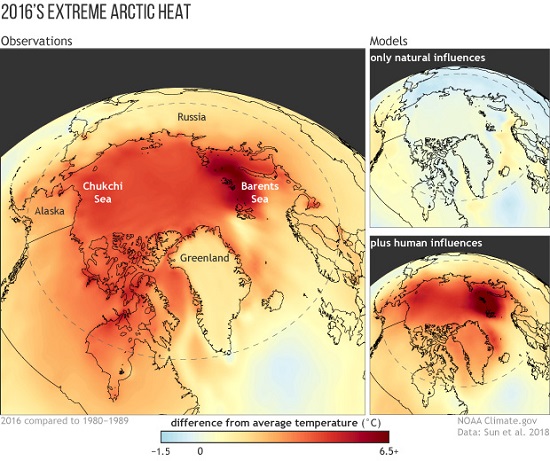
In the fall of 2016, the Arctic experienced heat that was so extreme that one expert called it a black swan event. That warmth helped set a new annual temperature record that was double the magnitude of the record set the year before. New NOAA-led research confirms that the event could not have happened without human-caused global warming and sea ice loss.
These maps compare the observed differences from average temperature in 2016 (left) to two computer simulations of 2016 (right). The top right map shows results from models that included only natural climate influences, using estimated conditions from the late nineteenth century. The bottom right map shows results from models in which things like greenhouse gases, sea surface temperatures, and sea ice were allowed to change as they have in the real world due to human activities.
None of the simulations using only natural climate influences were able to reproduce the extreme warmth that overtook the Arctic in 2016. Instead, those models projected that there would have been some areas that were cool and some that were warm, but not extremely so. Only the simulations that mirrored human-caused changes in greenhouse gases and the resulting sea ice loss were able to generate a realistic picture of the extreme heat. The most realistic simulations were generated by models in which sea ice was not only allowed to shrink in area, but also to thin—just as it has in the real world.
The scientists concluded that there was virtually zero chance that such an extreme heat event would have occurred without human influence on the climate. But they also concluded that its severity—exactly how far above average the temperatures were— was partially due to natural variability, including the influence of the strong 2015-16 El Niño event in the tropics.
This overlap of the impacts of human-caused climate change and natural variability is a common theme for many types of extreme weather events from high-tide flooding to heavy downpours. Events like the extreme warmth in the Arctic in 2016 are an early preview of what “normal” may look like within as little as a decade if greenhouse gas emissions continue their rapid rise.
References:
Sun, L., Allured, D., Hoerling, M., Smith, L., Perlwitz, J., Murray, D., & Eischeid, J. (2018). Drivers of 2016 record Arctic warmth assessed using climate simulations subjected to Factual and Counterfactual forcing. Weather and Climate Extremes, 19, 1–9. https://doi.org/10.1016/j.wace.2017.11.001
2016 Arctic heat would have been virtually impossible without global warming by Rebecca Lindsey, NOAA's Climate.gov, May 7, 2018
Toon of the Week...

Hat tip to Stop Climate Science Denial.
Graphic of the Week...

2018 Arctic temperatures (red line) compared with other years back to 1958. (Danish Meteorological Institute data adapted by Zachary Labe)
Another extreme heat wave strikes the North Pole by Jason Samenow, Capital Weather Gang, Washington Post, May 7, 2018
SkS in the News...
The Climate Denier Roundup article, Free Speech on Campus Under Attack...By the Koch Bros, posted on the Daily Kos includes the following:
Case in point: the AP last week reported that newly released documents from 2003 to 2011 revealed that the Kochs had influence over the hiring process for their Mercatus center at George Mason University. Considering the Kochs had funded the center to the tune of nearly $50 million, this should be more of a confirmation of suspicions than startling revelation. (To be perfectly clear, the Mercatus Center is somewhat independent of George Mason itself, which employs great folks like climate communications researcher Ed Maibach and Dr. 97% himself, John Cook.)
SkS Spotlights...
Program in Atmospheres, Oceans and Climate (PAOC)
PAOC oversees a broad program of education and research in atmospheric, oceanic, and climate sciences. We are engaged in some of the most intellectually challenging and important problems in science, such as the physics of hurricanes, and the dynamics of ice ages. PAOC is part of the Department of Earth, Atmospheric and Planetary Sciences at MIT and includes members from other MIT departments and from Woods Hole Oceanographic Institution.
The phenomena under study involve a large array of scientific disciplines - geophysics, geochemistry, physical and chemical oceanography, meteorology, atmospheric chemistry, and planetary science. The program carries out research and gives instruction in all of these principal areas. Perhaps more than any other program in the world, PAOC offers its students unique opportunities for interdisciplinary study and research. In all areas we emphasize a combination of theoretical, observational and modeling approaches.
Students and researchers come from all over the world attracted not only by our programs but also the city of Cambridge and its environs which contain many institutions active in atmospheric and oceanographic research; Harvard University, Woods Hole Oceanographic Institution, and the Boston Office of the National Weather Service, as well as many private companies.
Contact with all of these institutions is maintained through seminars and symposia. Moreover students can formally take subjects at the Woods Hole Oceanographic Institution and Harvard University. The research and educational programs of PAOC also benefit from the larger intellectual milieu provided by MIT with its strengths in science and engineering. In research there are no departmental boundaries and we collaborate freely across discipline. PAOC is also involved in undergraduate education within the Department of Earth, Atmospheric and Planetary Sciences.
Coming Soon on SkS...
- California, battered by global warming's weather whiplash, is fighting to stop it (Dana)
- SkS Analogy 12 - A sinking ship reaches new heights (Evan Whitby)
- Global warming, hurricanes, and rain (John Abraham)
- Global solar capacity grew faster than fossil fuels in 2017, says report (Simon Evans)
- New research this week (Ari)
- 2017 SkS Weekly Climate Change & Global Warming News Roundup #20 (John Hartz)
- 2017 SkS Weekly Climate Change & Global Waming Digest #20 (John Hartz)
Poster of the Week...
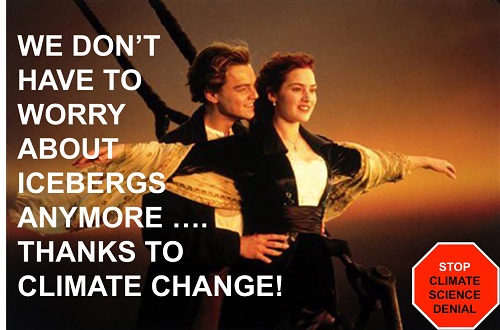
SkS Week in Review...
- 2018 SkS Weekly Climate Change & Global Warming News Roundup #19 by John Hartz
- New research, April 30 - May 6, 2018 by Ari Jokimäki
- Analysis: How much ‘carbon budget’ is left to limit global warming to 1.5C? by Zeke Hausfather (Carbon Brief)
- Global warming is melting Antarctic ice from below by John Abraham (Climate Consensus - the 97%, Environment, Guardian)
- The 1970s Global Cooling Zombie Myth and the Tricks Some People Use to Keep it Alive, Part II by David Kirtley
- Global warming will depress economic growth in Trump country by Dana Nuccitelli (Climate Consensus - the 97%, Environment, Guardian)
- 2018 SkS Weekly Climate Change & Global Warming Digest #18 by John Hartz
97 Hours of Consensus...
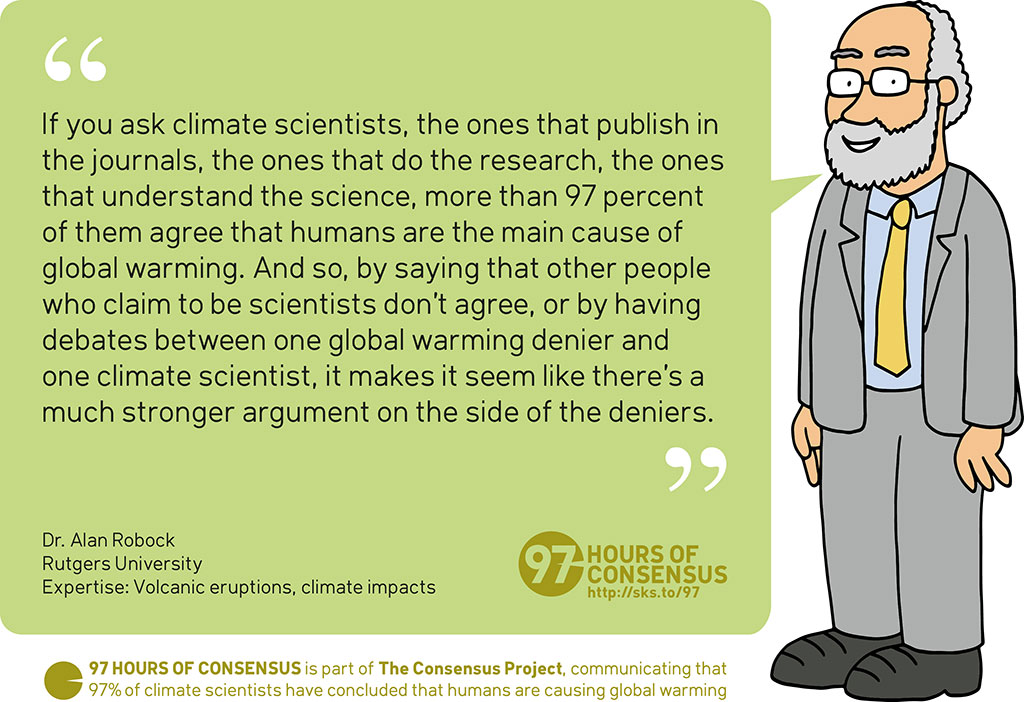
Alan Robock's bio page and quote source.
High resolution JPEG (1024 pixels wide)
from Skeptical Science
via IFTTT
Encyclopedia of American Loons: #2013: Tom Minnery
Kombucha: hype, harm and humbug
Read the rest here: Kombucha: hype, harm and humbug
Saturday, 12 May 2018
2018 SkS Weekly Climate Change & Global Warming News Roundup #19
Editor's Pick
Methane, Climate Change, and Our Uncertain Future
Methane is generally considered secondary to carbon dioxide in its importance to climate change, but what role might methane play in the future if global temperatures continue to rise?
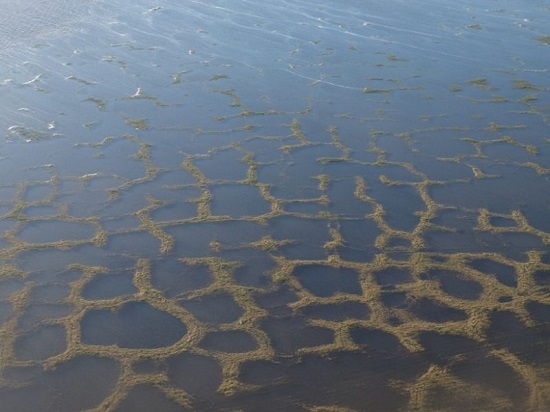
Flooded permafrost tundra in northeast Siberia. Hydrology is a key control on methane emissions in wetland and permafrost ecosystems. Credit: Joshua Dean
The greenhouse gas, methane, is produced by both natural processes and human activities. While there has been much attention paid to curbing anthropogenic emissions, a changing climate will likely increase the production of natural methane. In an open access article recently published in Reviews of Geophysics, Dean et al. [2018] describe the ways in which biological, geochemical, and physical systems influence methane concentrations and explore how methane levels in natural systems may alter in a warming climate. Here the authors answer some questions about the sources and significance of methane, and indicate some future research directions.
Methane, Climate Change, and Our Uncertain Future by Joshua Dean, Editors' Vox, Eos, May 11, 2018
Links posted on Facebook
Sun May 6, 2018
- One-sided dialogue as rich countries sit out talks on climate loss by Soila Apparicio, Climate Home, May 4, 2018
- Climate change: Scientists predict significant changes in monsoon rainfall by Syed Akbar, TNN/Times of India, May 5, 2018
- On Climate Change, a Disconnect Between Attitudes and Behavior by Tom Jacobs, Pacific Standard, May 4, 2018
- Pruitt's EPA Is on the Verge of 'Regulatory Capture', Study Says by Neela Banerjee, InsideClimate News, May 1, 2018
- Science can't solve climate change — better politics can, former IPCC scientist says by Anna Salleh, Science, ABC Radio News (Australia), May 1, 2018
- Green Climate Fund may ask donors for a refill in 2019 - director by Megan Rowling, Thomson Reuters Foundation, May 3, 2018
- Are we ready for an epidemic this summer?, Opinion by Ronald A Klain, Washington Post, May 4, 2018
Mon May 7, 2018
- The Carbon Brief Profile: Turkey by Jocelyn Timperley, Carbon Brief, May 5, 2018
- Making cities more dense always sparks resistance. Here’s how to overcome it. by David Roberts, Energy & Environment, Vox, May 5, 2018
- EPA’s climate change website went down a year ago for ‘updating.’ It’s still not back. by Chris Mooney, Energy & Environment, Washington Post, May 4, 2018
- The B.C. pipeline project you've never heard of — and why it may succeed by Mike Laanela, CBC News, May 5, 2018
- Lyme-carrying ticks and other dangerous pests are creeping into Utah, thanks to climate change by Emma Penrod, Salt Lake Tribune, May 5, 2018
- What genuine, for real, no-bullshit ambition on climate change would look like by David Roberts, Energy & Environment, Vox, May 7, 2018
- Global warming will depress economic growth in Trump country by Dana Nuccitelli, Climate Consensus - the 97%, Environment, Guardian, May 7, 2018
- Will the Clean Power Plan Repeal Come with a Replacement? by Niina Heikkinen, E&E News/Scientific American, May 7, 2018
Tue May 8, 2018
- Why We Need More Conversation When It Comes To Climate Change by Chris Shaw, Earth, Science Trends, May 4, 2018
- In Ancient Rocks, Scientists See a Climate Cycle Working Across Deep Time by Kevin Krajick, State of the Planet, Earth Institute, Columbia University, May 7, 2018
- Scientists Say Ocean Circulation Is Slowing. Here’s Why You Should Care. by Bob Berwyn, InsideClimate News, May 7, 2018
- 2016 Arctic heat would have been virtually impossible without global warming by Rebecca Lindsey, NOAA's Climate.gov, May 7, 2018
- Another extreme heat wave strikes the North Pole by Jason Samenow, Capital Weather Gang, Washington Post, May 7, 2018
- Tourism responsible for 8% of global greenhouse gas emissions, study finds by Daisy Dunne, Carbon Brief, May 7, 2018
- Three newspapers confront one challenge: Sea-level rise is real, South Florida needs all hands on deck — now, Editorial Board, Miami Herald, May 4, 2018
- Pediatricians are concerned about climate change, and here's why by Jacqueline Howard, Health, CNN, May 8, 2018
Wed May 9, 2018
- Facebook partners with global warming skeptics while cracking down on ‘untrustworthy’ news sources by Amy Martin, Consumer Affairs, May 7, 2018
- Because of climate change, hurricanes are raining harder and may be growing stronger more quickly by Jason Samenow, Capital Weather Gang, Washington Post, May 8, 2018
- The 1970s Global Cooling Zombie Myth and the Tricks Some People Use to Keep it Alive, Part II by David Kirtley, Skeptical Science, May 8, 2018
- E.P.A. Emails Shed Light on Pruitt’s Plan to Debate Climate Change by Lisa Friedman & Coral Davenport, Climate, New York Times, May 9, 2018
- Global warming is melting Antarctic ice from below by John Abraham, Climate Consensus - the 97%, Environment, Guardian, May 9, 2018
- Hotter seas threaten marine wildlife with extinction - researchers by Isabelle Gerretsen,Thomson Reuters Foundation, May 7, 2018
- 'It's all about vested interests': untangling conspiracy, conservatism and climate scepticism by Graham Redfearn, Planet Oz, Environment, Guardian, May 7, 2018
Thu May 10, 2018
- Extra climate talks scheduled amid Bonn stalemate by Karl Mathiesen, Climate Home News, May 8, 2018
- Development banks ‘not aligned’ with Paris Agreement goals: report by Soila Apparicio, Climate Home News, May 9, 2018
- Explainer: Six ideas to limit global warming with solar geoengineering by Daisy Dunne, Carbon Brief, May 9, 2018
- April: high CO2, low sea ice and extreme weather, World Meteorological Society (WMO) News, May 7, 2018
- Alien Waters: Neighboring Seas Are Flowing into a Warming Arctic Ocean by Cheryl Katz, Yale Environment 360, May 10, 2018
- King County, Washington Files Latest Suit Against Big Oil for Climate Impacts by Dana Drugmand, Climate Liability News, May 10, 2018
- Emails show EPA turned to climate skeptics to craft ‘red team-blue team’ exercise by Dino Grandoni, Energy & Environment, Washington Post, May 9, 2018
- Trump White House quietly cancels NASA research verifying greenhouse gas cuts by Paul Voosen, Science, May 9, 2018
Fri May 11, 2018
- "No follow up" from Trump over staying in climate pact-UN by Alister Doyle, Reuters, May 9, 2018
- Social investors see the light on clean energy for the poor by Megan Rowling, Thomson Reuters Foundation, May 10, 2018
- Pentagon revised Obama-era report to remove risks from climate change by Chris Mooney & Missy Ryan, Energy & Environment, Washington Post, May 10, 2018
- Bonn climate talks: key outcomes from the May 2018 UN climate conference by Simon Evans & Jocelyn Timperley, Carbon Brief, May 11, 2018
- Allergy explosion' across much of the country linked to climate change by Shamard Charles, NBC News, May 9, 2018
- Half of America’s carbon-free electricity comes from nuclear. Here’s how to save it. by David Roberts, Energy & Environment, Vox, May 10. 2018
- Here’s what vanishing sea ice in the Arctic means for you by Alessandra Potenza, Science, The Verge, May 10, 2018
- With Schneiderman Resignation, Exxon Climate Investigation Loses a Leader by Jennifer Dorroh, Climate Liability News, May 8, 2018
Sat May 12, 2018
- The environment is finally getting its day in court by Anna-Catherine Brigida, Yale Cimate Connections, May 11, 2018
- These 20 Water-Stressed Countries Have the Most Solar and Wind Potential by Tianyi Luo, World Resources Instittue (WRI), May 10, 2018
- La Niña is Gone; Severe Weather in Late-Spring Mode by Bob Henson, Category 6, Weather Underground, May 10, 2018
- Methane, Climate Change, and Our Uncertain Future by Joshua Dean, Editors' Vox, Eos, May 11, 2018
- Secret UK push to weaken EU climate laws 'completely mad' by Arthur Neslen, Environment, Guardian, May 9, 2018
- California upstages Australia by becoming first place to require solar panels on new homes by Sebastien Malo & Nichola Groom, Finncial Review (AU), May 11, 2018
- Hurricane season may be even worse in 2018 after a harrowing 2017 by Oliver Milman, Environment, Guardian, May 11, 2018
- American energy use, in one diagram by David Roberts, Energy & Environment, Vox, May 12, 2018
from Skeptical Science
via IFTTT
Friday, 11 May 2018
Should I Vaccinate My Child?
American Loon #2012: Forrest Mims
Read the full lunacy: #2012: Forrest Mims Encyclopedia of American Loons
Thursday, 10 May 2018
Good news ahead of the wedding: “Meghan Markel is a fan of alternative medicine”
Read the rest here: Good news ahead of the wedding: “Meghan Markel is a fan of alternative medicine”
Wednesday, 9 May 2018
American Loon #2011: Susan Miller
Read the full lunacy: #2011: Susan Miller Encyclopedia of American Loons
Tuesday, 8 May 2018
Medorrhinum: another surprising homeopathic remedy
Read the rest here: Medorrhinum: another surprising homeopathic remedy
Monday, 7 May 2018
American Loon #2010: Shira Miller
Read the full lunacy: #2010: Shira Miller Encyclopedia of American Loons
How turn a negative trial into a positive one? Simple, just cheat! PART TWO OF A SORRY TALE
Read the rest here: How turn a negative trial into a positive one? Simple, just cheat! PART TWO OF A SORRY TALE
Sunday, 6 May 2018
The German media campaign to save homeopathy
Read the rest here: The German media campaign to save homeopathy
American Loon #2009: Lloyd Miller
Read the full lunacy: #2009: Lloyd Miller Encyclopedia of American Loons
Saturday, 5 May 2018
2018 SkS Weekly Climate Change & Global Warming News Roundup #18
Editor's Pick
Earth’s atmosphere just crossed another troubling climate change threshold
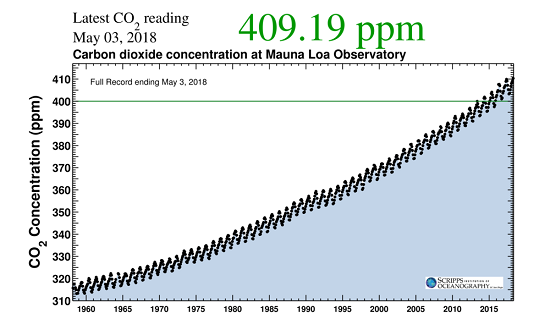
Recent CO2 measurements at Mauna Loa Observatory in Hawaii. (Scripps Institution of Oceanography)
For the first time since humans have been monitoring, atmospheric concentrations of carbon dioxide have exceeded 410 parts per million averaged across an entire month, a threshold that pushes the planet ever closer to warming beyond levels that scientists and the international community have deemed “safe.”
The reading from the Mauna Loa Observatory in Hawaii finds that concentrations of the climate-warming gas averaged above 410 parts per million throughout April. The first time readings crossed 410 at all occurred on April 18, 2017, or just about a year ago.
Carbon dioxide concentrations — whose “greenhouse gas effect” traps heat and drives climate change — were around 280 parts per million circa 1880, at the dawn of the industrial revolution. They’re now 46 percent higher.
As you can see in the famed “saw-toothed curve” graph above, more formally known as the Keeling Curve, concentrations have ticked upward in an unbroken progression for many decades. But they also go up and down on an annual cycle that’s controlled by the patterns and seasonality of plant growth around the planet.
Earth’s atmosphere just crossed another troubling climate change threshold by Chris Mooney, Energy & Environment, Washington Post, May 3, 2018
Links posted on Facebook
Sun Apr 29, 2018
- The Australian’s coverage of Great Barrier Reef study creates perception that scientists are divided by Scott Johnson, Climate Feedback, Apr 22, 2018
- Low-lying atolls could become ‘uninhabitable’ earlier than thought by Robert McSweeney, Carbon Brief, Apr 25, 2018
- The Carbon Brief Interview: Prof Stephen Belcher by Leo Hickman, Carbon Brief, Apr 26, 2018
- A Hawaiian island got about 50 inches of rain in 24 hours. Scientists warn it's a sign of the future by Heidi Chang, Los Angeles Times, Apr 28, 2018
- February and March madness: How winds miles above the Arctic may have brought wintry weather to mid-latitudes by Amy H Butler, NOAA's Climate.gov, Apr 27, 2018
- Desperate farmers left high and dry as federal relief funding runs out before drought does by Dominique Schwartz, ABC News (Australia), Apr 28, 2018
- Climate change: Australia's position is unconscionable for a wealthy country, Opinion by David Shearman, ABC News (Australia), Apr 28, 2018
- Cars Are Ruining Our Cities, Opinion by Justin Gillis & Hal Harvey, New York Times, Apr 25, 2018
Mon Apr 30, 2018
- China Installs Nearly 10 Gigawatts Of Solar In First Quarter, Up 22% by Joshua S Hill, Clean Technica, Apr 24, 2018
- Battling climate change with little resources: The fight of Mozambique's coastal cities by Katharina Wecker, Deutsche Welle, Apr 24, 2018
- Governments Meet in Bonn To Step Up Climate Action Critical to the implementation of Paris Agreement, UN Climate Press Release, Apr 28, 2018
- Trump administration drafts plan to unravel Obama-era fuel-efficiency rules, challenge California by Chris Mooney, Dino Grandoni & Juliet Eilperin, Energy & Environment, Washington Post, Apr 27, 2018
- Boaty McBoatface leads £20m mission to melting Antarctic glacier by Fiona Harvey, Environment, Guardian, Apr 30, 2018
- Republicans have so corrupted EPA, Americans can only save it in the voting booth by Dana Nuccitelli, Climate Conseunsus - the 97%, Envioronment, Guardian, Apr 30, 2018
- It’s time to think seriously about cutting off the supply of fossil fuels by David Roberts, Energy & Environment, Vox, Apr 29, 2018
- Growing Pressure for Lobbying Transparency in Climate Talks by Mike Small, DeSmog UK, Apr 30, 2018
Tue May 1, 2018
- Through Talanoa Dialogue, New Paths for Enhanced Action on Climate Change Are Emerging by Eliza Northrop & Nathan Cogswell, World Resouces Institute (WRI), Apr 27, 2018
- Climate-Linked Spending Set to Rise to a Quarter of EU Budget by Ewa Krukowska, Bloomberg News, Apr 30, 2018
- Texas Court OKs Exxon Attempt to Challenge California Climate Plaintiffs by Karen Savage, Climate Liability News, Apr 30, 2018
- Record heat for Australia in driest April for 21 years by Peter Hannam, Environment, Sydney Morning Herald, May 1, 2018
- State of the climate: Warm start to 2018 despite La Niña conditions by Zeke Hausfather, Carbon Brief, May 1, 2018
- Bonn morning brief: ‘We simply don’t have any time to waste’ by Karl Mathiesen, Megan Darby & Soila Apparicio, Climate Home, May 1, 2018
- Rising levels of 'frustration' at UN climate stalemate by Matt McGrath, Science, BBC News, May 1, 2018
- Industry Sway Over EPA Is Stronger Now Than Under Reagan, Study Says by Neela Banerjee, InsideClimate News, May 1, 2018
Wed May 2, 2018
- Former Exxon executive calls on oil industry to clean up its climate act by Bill Hafner, CNBC, Apr 30, 2018
- Mapped: African heatwaves could increase ‘five-fold’ with 3C of global warming by Daisy Dunne, Carbon Brief, Apr 27, 2018
- 11 key themes as countries take stock of Paris Agreement progress by Megan Darby, Climate Home, May 1, 2018
- Umbrella in a hurricane': U.N. says climate funding far too low by Alister Doyle & Laurie Goering, Reuters, May 2, 2018
- Shock and Thaw—Alaskan Sea Ice Just Took a Steep, Unprecedented Dive by Andrea Thompson, Scientific American, May 2, 2018
- Recent Australian droughts may be the worst in 800 years by Mandy Freund, Ben Henley, Kathryn Allen & Patrick Baker, The Conversation AU, May 2, 2018
- Mosquito season could get longer and more hazardous to your health — especially in Miami by Alex Harris, Health Care, Miami Herald, May 1, 2018
Thu May 3, 2018
- Mormon environmentalist conveys ecological message through fiction, Opinion by Jana Ries, Religious News Service (RNS), Apr 30, 2018
- Paris agreement: “Don’t water it down”, Lutheran World Federation, May 1, 2018
- Pakistan May Have Just Set a World Heat Record by Brian Kahn, Science, Earther, May 1, 2018
- The people who’ll be most hurt by climate swings did the least to cause them, study says by Chris Mooney, Energy & Environment, Washington Post, May 2, 2018
- Climate change aid to poor nations lags behind Paris pledges by Fiona Harvey, Environment, Guardian, May 2, 2018
- Carbon Dioxide Has Never Been Higher in Humanity's Existence by Brian Kahn, Science, Earther, May 2, 2018
- In Shadow of Trump's New Foreign Policy Team, U.S. Climate Negotiators Walk a Fine Line by Marianne Lavelle, InsideClimate News, May 3, 2018
- Caribbean Island Nations Cite U.S. Report at Climate Change Talks by Jean Chemnick, E&E News/Scientific American, May 3, 2018
Fri May 4, 2018
- Powerful Investors Push Big Companies to Plan for Climate Change by David S Rauf, Policy & Ethics, Scientific American, May 3, 2018
- Plants Find a New Way to Fight Climate Change — Nap by Marlene Cimons, Nexus News Media, May 2, 2018
- World Is Not on Track to Meet UN’s 2030 Sustainable Energy Goal by Georgina Gustin, InsideClimate News, May 3, 2018
- SkS Analogy 11 - Cabinets, airplanes, and frame of reference by Evan & jg, Skeptical Science, May 4, 2018
- Greenhouse gas concentrations hit highest level in human history by Andrew Freedman, Science, Mashable, May 3, 2018
- Kids Challenge Alaska’s Climate Paradox: Relying on Oil Production as Global Warming Wreaks Havoc by Sabrina Shankman, InsideClimate News, May 4, 2018
- The 1970s Global Cooling Zombie Myth and the Tricks Some People Use to Keep it Alive, Part I by David Kirtley, Skeptical Science, May 3, 2018
- ‘Sunny day flooding’ worsens at NC beaches — a sign sea rise is decades too soon, studies say by Abbie Bennett, The News & Observer (Raleigh, North Carolina), May 3, 2018
Sat May 5, 2018
- New research, April 23-29, 2018 by Ari Jokimäki, Skeptical Science, May 4, 2018
- Future sailors: what will ships look like in 30 years? by Fred Pearce, Environment, Guardian, May 3, 2018
- ‘Foehn winds’ causing Antarctica’s Larsen C ice shelf to melt in winter by Daisy Dunne, Carbon Brief, May 2, 2018
- ‘Manels’: Male speakers outnumber women two to one at UN climate talks by Soila Apparicio & Megan Darby, Climate Home, May 3, 2018
- Earth’s atmosphere just crossed another troubling climate change threshold by Chris Mooney, Energy & Environment, Washington Post, May 3, 2018
- Beneath a Melting Glacier, a Peruvian Town Prepares For the Worst by Daniel Setiawan, Justice, Eather, May 3, 2018
from Skeptical Science
via IFTTT